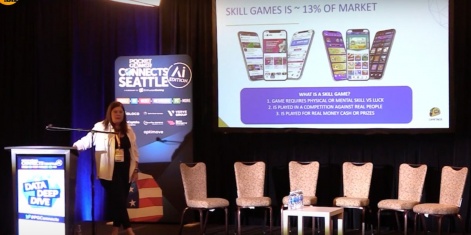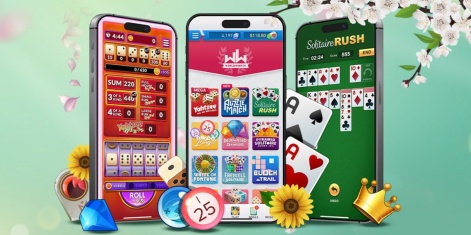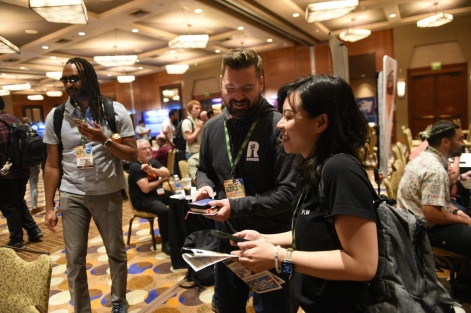With partnerships including Atari and game brands including Bejeweled, Scrabble and Trivial Pursuit, Game Taco is the USA’s leading tournament platform for online skill games with real cash prizes. It’s the parent company of WorldWinner, acquired in 2021. And it also has a new CEO. Nancy MacIntyre, who was appointed just before Pocket Gamer Connects Seattle in May.
MacIntyre gave a talk at the conference called “Evolving skill gaming for diverse audiences,” covering gender, generations and genre. And before she went on stage, we had a chance to quiz her exclusively about her market insights, her 25-year career in the games industry, and her philosophy for business.
From software to toys to mobile games
In her career, she has “launched over 100 games, had 11 number-one titles, with more than $2 billion in revenue.” After early stints at Lotus and Broderbund, she was one of the first employees to go to Hasbro when Hasbro was starting an interactive division, which ended up acquiring Atari. “I ended up running the marketing efforts for kids and family,” she tells us, name-dropping brands like Monopoly and RollerCoaster Tycoon. “And from there, I went to running global sales and marketing at Lucasfilm.”
MacIntyre went to THQ and on to toy company Leapfrog, seeing the potential of mobile games when the App Store launched.
“Everybody working at Leapfrog, everyone in the toy business, was saying, ‘Nobody’s gonna give a $600 device to a kid’,” she jokes. “But I lived in San Francisco, and even in the beginning, I would see parents in restaurants handing a phone to their kid to play. And I knew then that Nintendo was not our competition. Every mom with a cell phone was our competition.”

Following that revelation, she spent 10 years running Fingerprint, a startup focused on the mobile games space for kids, which she sold to private equity firms in 2021. The CFO from LucasArts, who’d been a great help to MacIntyre at Fingerprint, had gone to Game Taco, and he drew her attention to the skill gaming category.
The mass-market potential of skill gaming
“It’s a business that’s somewhat untapped,” she says. “I started looking at skill gaming, and as a product person and a marketer, I immediately thought: I totally get this. It’s the natural evolution of freemium games. As gamers are evolving, and getting into eSports, and playing more sophisticated levels of games, they’re going to want to have some skin in the game. Money makes total sense.”
The audience, it seems, is incredibly broad for skill games. “More than half are women,” says MacIntyre. “There are as many people over the age of 45 playing as there are younger ages. It’s much more diverse in terms of the audience than video games at large. And I liked that, because I’m a mass marketer at heart. I really focus on things that can become part of people’s lives.”
A lot of our time is spent making sure the games we put out there meet the criteria for skill gaming, which is both legal and mathematicalNancy MacIntyre, Game Taco
Game Taco is a technology company founded in 2016 to build a better matchmaking system for the skill game sector. Under chairman David Nathanson, who was also on the board of FanDuel, Game Taco acquired WorldWinner from Sony in order to scale with the help of funding from Platinum Equity.
Game Taco subsequently operates two brands: the wholly-owned WorldWinner, a direct-to-consumer business, and the other is Fan Duel Faceoff, built in partnership with FanDuel. FanDuel is part of Flutter Entertainment, the largest daily fantasy sports business and sports betting business based in the UK.
Classic games and cash-prize tournaments
It’s the technology platform powering WorldWinner and FanDuel, but Game Taco also has an internal game studio. “We’re making games that can be either on WorldWinner or FanDuel Faceoff,” says MacIntyre. “Some are exclusive to FanDuel, like golf with Jordan Spieth and an NFL game with Pat McAfee. On the WorldWinner side, we’re focused on mass market, so we have games like Wheel Of Fortune and Scrabble and Boggle.”
Just how big is the skill game scene? “Round numbers: probably somewhere between 13% and 15% of the entire mobile games market,” explains MacIntyre. “It’s substantial, and the US and India are the two largest markets today. But it is gradually growing in other markets worldwide and will continue to grow.”

Skill games are often casual games, which accounts for some of the mass-market appeal, and they’re also familiar games – often card games, board games or bingo-style games. But there are crossovers with sports and casino games too. “People that are playing skill games are also people that are playing freemium games. It’s like a natural evolution. They get great at the Bejeweled, and then they’re like, ‘I can beat you at Bejeweled… Why not enter a tournament?”
Skill games differ from other casual games because the tournaments have cash prizes in this sector. “We’re running tournaments that run from 88 cent entry fee up to $100,” explains Nancy MacIntyre. “Some events are head-to-head, some are multiplayer, and some of our most popular events are unlimited events where you can enter as many times as you want. There might be 2,000 people in a particular tournament. Skill gamers want fun first – the cherry on top is the opportunity to win.”
A gamer-first philosophy
As the incoming CEO, MacIntyre’s vision for Game Taco is about putting those gamers first. PocketGamer.biz asks about her management philosophy, and she responds, “It starts with the customer. I only think about the customer.”
She continues: “We have people playing for 15 years. We are a brand name, and because we’re playing with people’s money, trust and taking care of a customer is the only thing that matters. So: have a great product, have a platform that makes them want to come back, reward them for being a loyal player, make great games that they want to play over and over.”
MacIntyre also says “every touch point” has a role in that, including customer service, how people withdraw prize money, and the fairness of the matches. She uses the word “integrity” many times.
I hope more quality game companies want to participate in skill gaming. We’re always looking for innovationNancy MacIntyre, Game Taco
“The ways we have to drive a positive customer experience, they’re getting better every day,” she says. “I really focus on that. But it starts with: what does the customer want?”
But what about the future beyond the immediate fan base? “The next step is to try and convince the broader audience of mobile gamers,” she says, citing that “almost 50% of mobile gamers” say they are interested in playing for money. MacIntyre wants to get those people playing in tournaments.
And then long term, it’s about “taking that to all the markets around the world where this type of game experience makes sense.”
Gaming and the law
On that note, it’s essential to be aware that skill games with cash prizes occupy a precise legal definition, and the rules change from territory to territory.
“A lot of our time is spent making sure the games we put out there meet the criteria for skill gaming, which is both legal and mathematical,” she confesses. “Every game we put out goes through a rigorous evaluation. The engineers run the mathematics – if you want to assert that games are not luck based, that’s important.”
More than that, there’s a secondary evaluation by an attorney. She continues: “We ensure that where we advertise and distribute the games, we can prove they are actually skill games, not gambling. We spend time making sure – from the very concept stage – that a game will meet the criteria and that it’s properly vetted before we send it out.”
The road ahead for skill games
So what are the significant challenges facing the skill gaming category now? Are they the same as other sectors of the mobile gaming space? She cites the overall economy and the impact on the App Store of the IDFA changes. But points out, “We’re unique in that about 50% of our business is on the web. We’re a robust web business and an App Store business. App Store rules have impacted us, shifted the balance, but because we have robust web products, it’s been less of an issue for us.”
She points out the value of continuing to test and innovate. “We’re in a mode where we are constantly testing new techniques. And our CFO would say: ‘The only thing that matters is the return on ad spend.’ But because we have a more diversified product line across web and app, we’re less impacted by the changes in the app store.”

In the last 18 months, the company has launched 16 new games. “We launched a Yahtzee slots game that’s been wildly successful. There’s a new version of Wheel Of Fortune. And we’ve launched a new version of Trivial Pursuit,” says MacIntyre. “Coming up in the back half of this year, roughly six new releases are coming. We are capitalizing on some of the play patterns we have seen work. Our players have asked for word games, puzzle games, hidden picture games, and more and more card games. There’s an almost unlimited desire for them.”
Casual and core: a diverse group of gamers
Nancy MacIntyre’s talk at PGC Seattle was about the audience and how much broader and diverse the market is – especially for skill games – than you might think.
“The skill game audience is much broader than the video game industry at large,” she explains. “A third of the players are what you would call middle-aged or older. And a third of the people are under 30! It’s also much more female.”
Despite not being traditional ‘core gamers’, this audience does commit.
As gamers are evolving, and playing more sophisticated levels of games, they’re going to want some skin in the gameNancy MacIntyre, Game Taco
“What we’ve discovered about skill gaming is that people who play skill games play more games than anybody else,” smiles MacIntyre. “If you look at casual games as a whole, they spend about twice as much as the regular population. They play more hours per week. We find they might play 15 hours a week on their skill games, but they also might play 20 hours a week playing regular games. These are people where gaming is their primary form of entertainment – gaming is their thing. It might be Solitaire; the games tend to be more casual. They might also play shooters, but they play sports and casino games."
"There’s an ‘aha’ moment," she continues, "When you think about what a core gamer means. Our players are ultimate gamers, playing games on every platform, console, web, and phone. They’re playing games across both freemium and cash.”
“They don’t necessarily call themselves gamers,” she muses. “But they are people that like excitement, every level. And the skin-in-the-game of potentially winning… They’re also likely to do scratch-off tickets. They like to buy lottery tickets. They like to watch sports and maybe place a bet. This is the natural evolution of that: ‘I’m great at playing Spider Solitaire, and I know I can beat everybody I play, so why not play it for money?’”
The potential of the industry
MacIntyre explains that she’s interested in expanding the types of games that can work in skill games “because the audience is so diverse”. FanDuel has launched a football game, a basketball game, a sports game and a golf game. “I hope more quality game companies want to participate in skill gaming and want to play ball with us. We have the leading platform. We’re always looking for innovation and new games,” she says. “I’d like to see some of the best game developers out there be working with us and others to deliver games that work great in a tournament environment. I think that would be super exciting.”
And this is a general vision she has for the whole category. If MacIntyre has hopes for the industry as a whole, it’s that more people get to hear about the space and more studios get involved. “It’s a category that not many people know about,” she says. “We’ve more than tripled the entry fees we took in the last year. Day in and day out, we’re doing a million dollars in entry fees. We run about nine million tournaments a month. We’ve had 34 million people play WorldWinner in its time. This is a real business! And it’s something that isn’t completely understood by the gaming community.”
“If skill gaming is 13% of the overall mobile gaming business today, I think we’re going to wake up in a couple of years from now, it’ll be much bigger than that,” she concludes. “Because in the same way that esports has become mainstream, I fully expect skill games to become mainstream.”
You can watch Nancy MacIntyre’s speech from Pocket Gamer Connects Seattle above. Find out more about Game Taco, WorldWinner and FanDuel at their official websites. The next opportunity to hear from the top mobile game CEOs is at GameExpo Dubai and then at PGC Toronto.






















